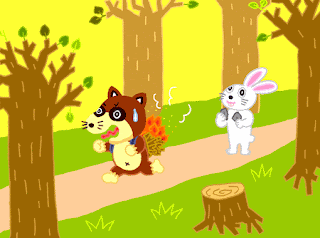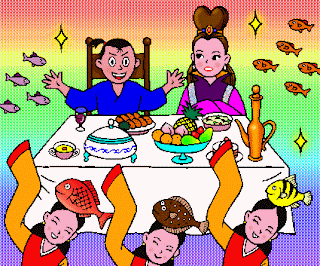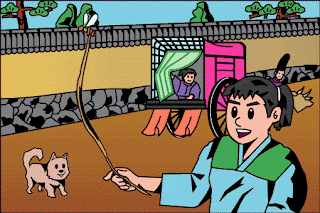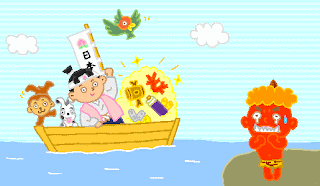Long long ago there lived a kind-hearted old farmer and his wife. The two made friends with a rabbit that lived in the mountains nearby, and came to love it as if it were their own daughter. In the same area there also lived a mean raccoon, who constantly destroyed the old man's field. This became so disturbing to the old man that one day he captured him.
Some days later, the rabbit dressed up in pretty clothes and lay in wait for the raccoon. When the raccoon appeared, she said to him: "I need to carry this firewood to the mountains but my legs are hurting. Would you be so kind as to carry it for me?" The raccoon decided to show off to the rabbit and hoisted the load onto his back.
The rabbit then began to strike her flint. The raccoon, unable to see because of the heavy load on his back, asked, "Hey, what's that scratching noise?" The rabbit replied, "It's the sound of the screechy birds from the screechy mountain." Finally, the rabbit ignited the flame and lit the firewood. The fire whooshed upward in a roar. The raccoon asked, "Hey, rabbit, what is that cackling sound?" The rabbit answered, "It's the sound of the cackling birds from the cackling mountain." At last, the flame burned through the wood and reached the raccoon's back. "Ah! Help me!" cried the raccoon. Frightened and scorched, he turned and fled.
The next day the rabbit, appearing in a disguise, prepared a batch of soy bean paste containing red hot peppers. Soon the burn-blistered raccoon came along. The rabbit called out: "This medicine is excellent for burns. Let me rub some on for you." The raccoon was elated and asked the rabbit to apply some to his back. But when the red peppers touched his burns, he screamed: "Ah, Ah, that hurts!" He rolled around on the ground in agony, legs flailing in the air.
After the raccoon's burns healed, the rabbit put on yet another disguise and called him over. "Would you like to go fishing?" "Fishing?" responded the raccoon, "Mm, that sounds good!" The rabbit then said, "Let's build a couple of boats. I'm light so I'll build my boat out of light wood. You're heavy so you need to make yours out of heavy mud." The greedy raccoon was fooled again and did as he was told.
When the boats were finished they set them in the water. The rabbit, leading the way, floated farther and farther down the river. Soon the raccoon's boat became water-logged and started to fall apart. "Ah, save me!" he cried. But far from saving the raccoon, the rabbit began to hack at the boat with her oar. "This is in revenge for killing the old woman!" Helpless, the evil raccoon sank to the bottom of the river.
Read more...













































